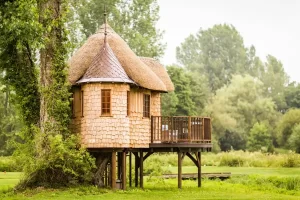In a world where travel is more accessible than ever, the need for eco-friendly travel has become increasingly important. As global tourism expands, so does its environmental impact, making it essential for travelers to consider sustainable options that help protect the planet. Eco-friendly travel is more than just a trend—it’s a conscious decision to explore the world while reducing our footprint, preserving natural landscapes, and supporting local communities.
Sustainability in tourism means taking steps to minimize the negative effects of travel, such as reducing carbon emissions, conserving water, and promoting biodiversity. It also involves promoting local cultures and economies in a way that benefits both visitors and the people who live in those destinations. The hospitality industry is at the forefront of this movement, offering accommodations that embrace green practices while still providing a high level of comfort and luxury.
You no longer have to choose between sustainability and a memorable, luxurious stay. Many eco-friendly accommodations now integrate green initiatives like renewable energy sources, water conservation, and waste reduction without sacrificing the quality of your experience. Whether it’s a sleek urban hotel powered by solar energy or a serene eco-lodge nestled in nature, you can enjoy green comfort while knowing your stay is contributing to a healthier planet.
What Does It Mean to Be an Eco-Friendly Stay?
Eco-friendly accommodations go beyond simply offering a place to rest. They are designed to minimize the environmental impact of tourism while enhancing the travel experience. These lodgings prioritize sustainability in everything from construction to daily operations, ensuring that your stay aligns with your values of protecting the planet.
When choosing an eco-friendly stay, there are a few key features to look for:
- Renewable Energy: Many sustainable hotels and lodges use solar, wind, or hydropower to meet their energy needs, significantly reducing their reliance on fossil fuels.
- Waste Reduction: Zero-waste initiatives, recycling programs, and composting are common practices at eco-friendly accommodations. Hotels may offer reusable toiletries, eliminate single-use plastics, or reduce food waste through sustainable dining options.
- Sustainable Materials: The construction and furnishings of eco-lodgings often feature sustainable materials such as reclaimed wood, bamboo, and eco-friendly fabrics. These materials not only reduce deforestation and pollution but also create healthier indoor environments.
To identify truly sustainable accommodations, look for recognized certifications such as:
- LEED (Leadership in Energy and Environmental Design): A globally recognized symbol of sustainability achievement, LEED-certified buildings are designed with energy savings, water efficiency, and indoor air quality in mind.
- Green Key: This international certification indicates that a hotel has implemented high environmental standards in areas like water use, energy efficiency, and staff training.
- EarthCheck: A leading scientific benchmarking organization that certifies hotels, resorts, and tourism destinations committed to minimizing their environmental impact.
The Benefits of Staying at Eco-Friendly Accommodations
Choosing eco-friendly accommodations offers a range of benefits—not just for the environment, but for travelers and local communities alike.
- Reduced Environmental Footprint: By staying in lodgings that use renewable energy, reduce waste, and conserve water, you’re actively reducing your personal impact on the planet. Every small effort, from choosing hotels that avoid single-use plastics to supporting properties that minimize energy consumption, contributes to a more sustainable world.
- Supporting Local Communities and Businesses: Many eco-friendly accommodations prioritize sourcing local products, hiring local staff, and engaging in community projects. This not only boosts local economies but also ensures that your money is helping to preserve the cultural and natural heritage of the places you visit.
- Healthier Living Environments: Sustainable accommodations often prioritize the health of their guests and staff by using non-toxic cleaning products, organic bedding, and natural materials that improve indoor air quality. This creates a safer, cleaner, and more relaxing environment for you to enjoy during your stay.
- Personal Benefits: There’s something incredibly rewarding about knowing that your travel choices are making a positive impact. Staying at an eco-friendly hotel or lodge allows you to enjoy your vacation guilt-free, with the added satisfaction of knowing you’ve contributed to a healthier planet. It’s a meaningful way to align your values with your travel experiences, creating a deeper connection to the places you visit.
Top Eco-Friendly Accommodations Around the World
As sustainable travel becomes more popular, eco-friendly accommodations are flourishing across the globe. These destinations offer travelers the opportunity to immerse themselves in nature, experience local cultures, and minimize their environmental impact. Let’s explore some of the top eco-friendly accommodations across various continents.
Europe
Europe is home to some of the most innovative eco-friendly accommodations, blending sustainable practices with luxury and comfort.
- Manon Les Suites, Copenhagen, Denmark: This stylish, urban hotel in Copenhagen is a prime example of Scandinavian sustainability. Powered by renewable energy and offering organic, locally-sourced food, it provides an eco-friendly oasis in the heart of the city. The hotel boasts a tropical courtyard with natural elements, recycling initiatives, and water-saving technologies.
- Ecoresort Il Cantico della Natura, Umbria, Italy: Nestled in the lush countryside of Umbria, this sustainable agriturismo (farm stay) offers a rustic, eco-friendly experience. Solar energy powers the resort, while its farm-to-table restaurant serves organic, locally grown produce. Guests can also explore nature trails or participate in workshops on sustainability.
- Whitepod Eco-Luxury Hotel, Switzerland: Set in the Swiss Alps, Whitepod offers luxury pods designed with sustainability in mind. Each pod minimizes energy use, with low-impact heating systems and locally sourced materials. The resort prioritizes energy efficiency and waste reduction, while immersing guests in the beauty of the natural landscape.
North America
North America boasts a wide array of sustainable hotels and lodges, many located in stunning natural settings.
- Cavallo Point, Sausalito, California: Located just outside San Francisco, this luxurious eco-resort blends historic charm with modern sustainability. Cavallo Point operates with a zero-waste goal, uses solar energy, and offers locally sourced, organic cuisine. The property also emphasizes wellness, offering yoga, hiking, and spa treatments rooted in holistic practices.
- Fairmont Chateau Lake Louise, Alberta, Canada: This stunning lakeside resort in the heart of Banff National Park is committed to sustainability. It has initiatives to reduce its carbon footprint, such as energy-efficient lighting and a comprehensive recycling program. The resort supports local farmers and artisans while offering guests incredible outdoor experiences, from hiking to canoeing.
- Proximity Hotel, Greensboro, North Carolina: As one of the greenest hotels in the U.S., Proximity Hotel is LEED Platinum-certified, using 40% less energy than comparable hotels. With 100 solar panels, geothermal heating, and recycled materials in its construction, Proximity proves that sustainability and luxury can coexist.
Asia
Asia is home to some of the world’s most unique eco-retreats, many of which are deeply rooted in local culture and tradition.
- Six Senses Yao Noi, Thailand: Perched on an island in Phang Nga Bay, this luxurious resort is a beacon of sustainability. Six Senses Yao Noi is powered by solar energy and incorporates water conservation, waste management, and organic farming into its operations. The resort offers eco-conscious experiences such as sustainable diving and wildlife conservation tours.
- Hoshinoya Tokyo, Japan: This minimalist, eco-friendly ryokan (traditional Japanese inn) blends ancient Japanese traditions with modern sustainability. Hoshinoya Tokyo uses geothermal energy for heating and cooling, prioritizes energy efficiency, and practices water conservation. Guests can enjoy locally sourced cuisine and traditional tea ceremonies in this tranquil urban oasis.
- Bambu Indah, Bali, Indonesia: A unique eco-resort built from repurposed antique Javanese homes, Bambu Indah showcases Bali’s commitment to sustainability. With bamboo architecture, natural spring water pools, and organic gardens, the resort promotes eco-friendly living. Guests can also engage with local communities through cultural and environmental initiatives.
Africa
Africa’s eco-lodges and camps provide incredible wildlife experiences while prioritizing conservation and sustainability.
- Chumbe Island Coral Park, Zanzibar, Tanzania: This private island eco-lodge is a model of sustainability. Powered entirely by solar energy, Chumbe Island Coral Park uses rainwater harvesting and composting toilets. The lodge also supports marine conservation and educates guests on protecting the delicate coral reefs surrounding the island.
- Kakuli Bush Camp, Zambia: Set in the heart of South Luangwa National Park, Kakuli Bush Camp is an eco-friendly safari lodge that prioritizes conservation. The camp runs on solar power and uses sustainable materials in its construction. Kakuli works closely with local communities and wildlife organizations to promote conservation efforts in the area.
- Grootbos Private Nature Reserve, South Africa: Known for its commitment to biodiversity conservation, Grootbos combines luxury with sustainability. The reserve protects indigenous flora and fauna, practices permaculture farming, and employs solar power. Guests can enjoy eco-safaris, whale watching, and exploring the unique fynbos landscape.
Oceania
Oceania’s eco-friendly accommodations focus on preserving the region’s unique natural beauty, from rainforests to coastlines.
- Saffire Freycinet, Tasmania, Australia: Located on Tasmania’s pristine east coast, Saffire Freycinet is a luxury eco-resort that blends seamlessly into its surroundings. The resort operates with a minimal environmental footprint, using sustainable materials and energy-efficient systems. Saffire actively supports local conservation efforts and offers guided wildlife experiences, including encounters with endangered species.
- PurePods, New Zealand: For a truly immersive eco-experience, PurePods offers glass-walled cabins in remote locations across New Zealand. These off-grid pods use solar power, rainwater harvesting, and composting systems to ensure minimal environmental impact. Guests can enjoy breathtaking views of New Zealand’s landscapes, from rugged coastlines to alpine meadows.
- Thala Beach Nature Reserve, Queensland, Australia: Set between the Great Barrier Reef and the Daintree Rainforest, Thala Beach is an eco-certified retreat focused on preserving the region’s ecosystems. The lodge uses sustainable building practices, solar energy, and water conservation techniques. Guests can explore the rainforest, snorkel the reef, and learn about indigenous cultures during their stay.
These eco-friendly accommodations prove that you don’t have to compromise comfort, luxury, or adventure to travel sustainably. From Africa’s savannas to Europe’s cities, these lodgings offer travelers a greener way to explore the world.
How to Choose the Right Eco-Friendly Accommodation for Your Needs
Selecting the right eco-friendly accommodation can significantly enhance your sustainable travel experience. Here’s how to find the perfect green stay that meets your preferences and values:
- Location: Consider the destination and its proximity to public transportation or natural attractions. Staying closer to your points of interest reduces transportation emissions, allowing you to explore the area on foot, by bike, or via eco-friendly transit options.
- Type of Accommodation: Different types of eco-friendly lodgings offer unique experiences. For example, eco-lodges or glamping sites immerse you in nature, while urban eco-hotels provide sustainable luxury in city settings. Consider whether you prefer rustic charm or modern conveniences as part of your stay.
- Amenities: Look into the amenities offered by eco-friendly accommodations. Are they energy-efficient? Do they use renewable energy, organic products, or biodegradable toiletries? Some properties may offer organic dining options, wellness programs, or guided eco-tours that align with your sustainable values.
When booking, it’s essential to do your research:
- Read Reviews and Check Certifications: Reviews from fellow eco-conscious travelers can help you verify if a property truly delivers on its sustainability promises. Additionally, look for certifications such as LEED, Green Key, or EarthCheck, which indicate a commitment to green practices.
- Research Sustainability Practices: Check the hotel’s website for transparency about their eco-friendly initiatives. Do they mention energy and water conservation, waste reduction, or efforts to support local communities? A property that is upfront about its sustainability efforts is more likely to be committed to the cause.
For a more streamlined search, several websites and apps make it easy to find eco-friendly accommodations:
- EcoHotels: A platform offering a variety of sustainable stays worldwide, with a focus on promoting hotels that meet high environmental standards.
- Green Pearls: This website highlights eco-friendly hotels, resorts, and lodges around the globe, focusing on sustainability, environmental consciousness, and social responsibility.
- BookDifferent: This booking site labels properties based on their sustainability rating, helping you make informed decisions that align with your environmental goals.
Practical Tips for Being a Responsible Guest
Even the greenest accommodation can benefit from guests who are mindful of their environmental impact. Here are a few ways to travel responsibly and make the most of your eco-friendly stay:
- Conserve Water: Simple actions like reusing towels, taking shorter showers, and turning off the tap while brushing your teeth can significantly reduce water waste. Many eco-friendly hotels offer towel and linen reuse programs—opt in to conserve resources.
- Reduce Energy Use: Turn off lights, air conditioning, and other electronics when you leave your room. Some accommodations use energy-efficient systems like key card-activated power, but it’s always good to be mindful of your energy consumption.
- Recycle and Minimize Waste: Take advantage of any recycling options your accommodation provides. Bring reusable items such as water bottles, shopping bags, and containers to avoid contributing to single-use plastic waste during your stay. Opt for digital tickets and receipts whenever possible.
- Support Local Economies: One of the most impactful ways to travel sustainably is to support local businesses. Choose eco-conscious tour operators who engage in responsible tourism and employ local guides. When dining, seek out restaurants that source organic, local ingredients, helping to reduce the carbon footprint of your meals while supporting the community.
- Pack Eco-Friendly Travel Essentials: Your packing choices can also contribute to a greener travel experience. Bring reusable products like a stainless steel water bottle, travel cutlery, or eco-friendly toiletries in solid form (e.g., shampoo bars) to avoid plastic packaging. Choose travel gear made from sustainable materials, such as organic cotton or recycled polyester.
By following these simple tips, you can minimize your environmental impact while enjoying an eco-friendly stay, making your travel both enjoyable and responsible. Every small action counts toward making a positive difference for the planet.
Conclusion
Choosing eco-friendly accommodations is not just a trend but a meaningful way to travel with purpose. By selecting lodgings that prioritize sustainability, you reduce your environmental impact and contribute to the preservation of the natural and cultural wonders that make travel so enriching. From renewable energy and waste reduction to supporting local communities, these green stays offer a unique blend of comfort, luxury, and responsibility.
As you plan your future travels, consider how your choices can positively affect the environment and local economies. Whether you’re staying at a sustainable city hotel, an off-grid eco-lodge, or a nature-friendly retreat, prioritizing sustainability in your accommodations ensures that your adventures leave a lighter footprint on the planet.
Ultimately, travelers hold significant power to drive change in the tourism industry. By embracing green comfort, you not only enjoy a more authentic, meaningful travel experience but also play a role in shaping a more sustainable future. Every eco-friendly stay is a step toward protecting the world we love to explore—one responsible choice at a time.




